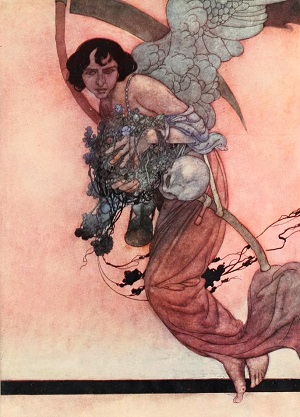| directory |
| home | contact |
|
|||||||||||||||
| search | |||||||||||||||
SONNET 5Those Hours, that with gentle work did frameThe lovely gaze where every eye doth dwell, Will play the tyrants to the very same And that unfair which fairly doth excel: For never-resting Time leads Summer on To hideous Winter and confounds him there; Sap check'd with frost and lusty leaves quite gone, Beauty o'ersnow'd and bareness every where: Then, were not summer's distillation left, A liquid prisoner pent in walls of glass, Beauty's effect with beauty were bereft, Nor it, nor no remembrance what it was. But flowers distill'd though they with winter meet, Leese but their show; their substance still lives sweet. NOTES The subject of the previous sonnets continues, and here we have the introduction of "never-resting Time"; that ominous figure seemingly ever-present in Shakespeare's mind, as seen both in his sonnets and in his dramas after 1599. See Sonnet 19, Sonnet 32, and Sonnet 73 for more on this topic. Compare also Hamlet (5.1) with Sonnet 65, and, in particular, Sonnet 146 for striking similarities. gaze (2): object gazed at. unfair (4): deprive of beauty (the only place it is used by Shakespeare). fairly (4): beautifully and legitimately. confounds (6): destroys. checked (7): halted. distillation (9): perfume distilled from flowers. 1 bereft (11): lost. Leese (14): lose (again, the only place it is used by Shakespeare). Footnote 1 Parke Godwin elaborates: "In this sonnet and the following the process of distillation, by which the dead matter of flowers, etc., is converted into fine odors and essences, is used as a figure or symbol of the manner in which art lifts any object or aspect of nature into a higher form. It is also used in several of the plays, as in As You Like It (iii., 2, 134), where it is said that all the graces of nature -- Helen's cheek, Cleopatra's majesty, Atalanta's better part, and Lucretia's modesty -- have been "distilled" into the one body of Rosalind. So in Troilus and Cressida (i., 3, 350), Nestor remarks that the man who is to go forth and meet Hector must be a man "distilled from all our virtues"; again in Henry V, (iv., 1, 5), where Henry observes that "there is a soul of goodness in things evil, would men observingly distil it out," and Jonson used the same figure in The Poetaster of Shakespeare's own writings, as "distilled" from his judgment. There is fitness, if not felicity, in the image when applied to the creative faculty which turns the rudest material into forms of beauty; but when it is pushed a little farther, as in the Midsummer Night's Dream (i., 1, 76), and procreation itself is characterized by the term, it seems to me, though remotely pertinent, to be carried to an extreme" (Sonnets, p. 78). How to cite this article:______ Even More... |

More to Explore _____
_____ |
©1999-2021 Shakespeare Online. All Rights Reserved.
 Granted, Shakespeare gave us more memorable quotes than any other writer, but often he gets credit for the clever quips of other greats, like Ben Franklin and John Milton.
Granted, Shakespeare gave us more memorable quotes than any other writer, but often he gets credit for the clever quips of other greats, like Ben Franklin and John Milton.